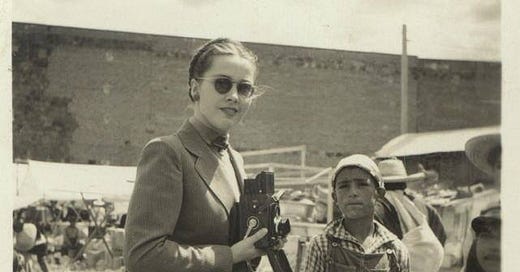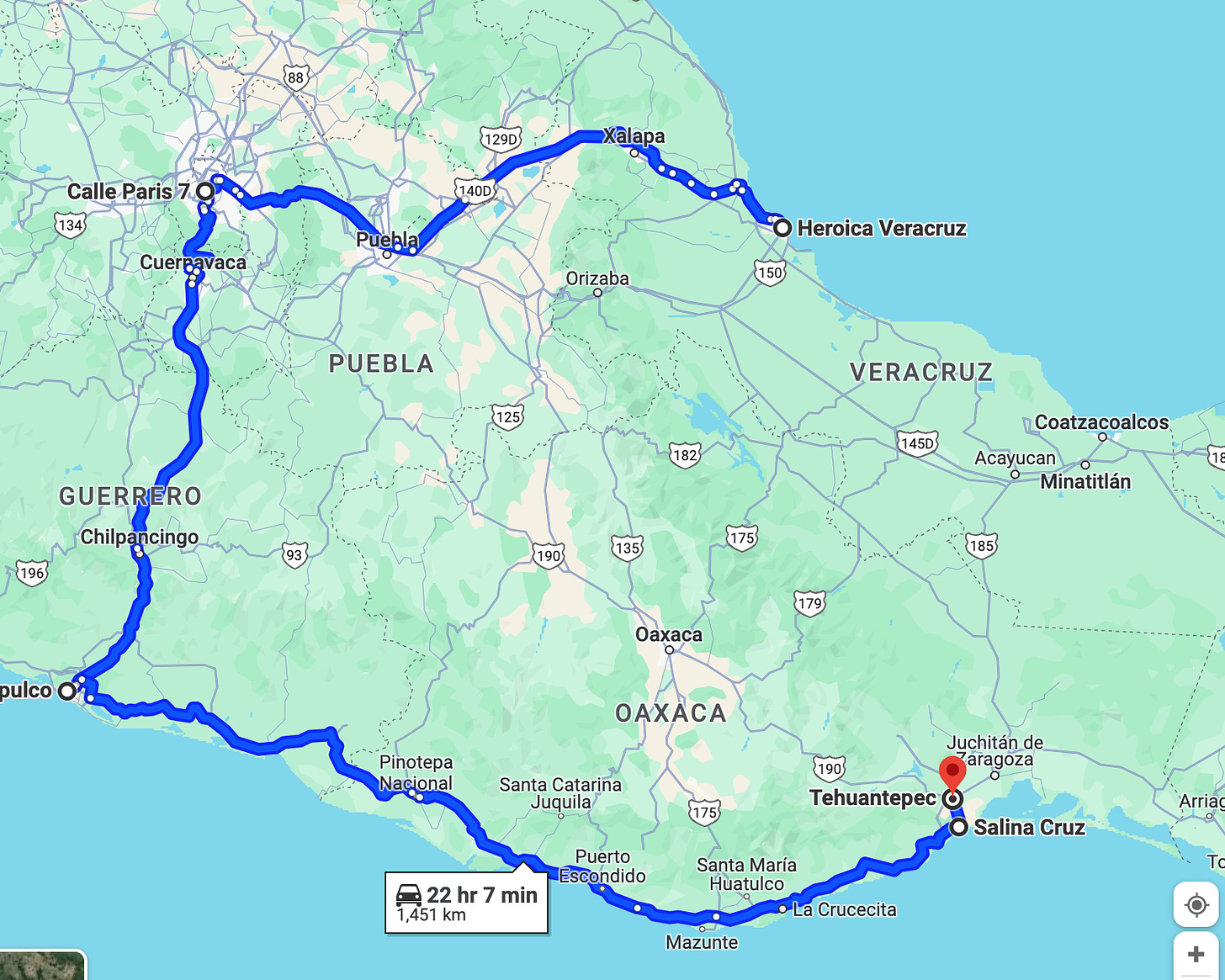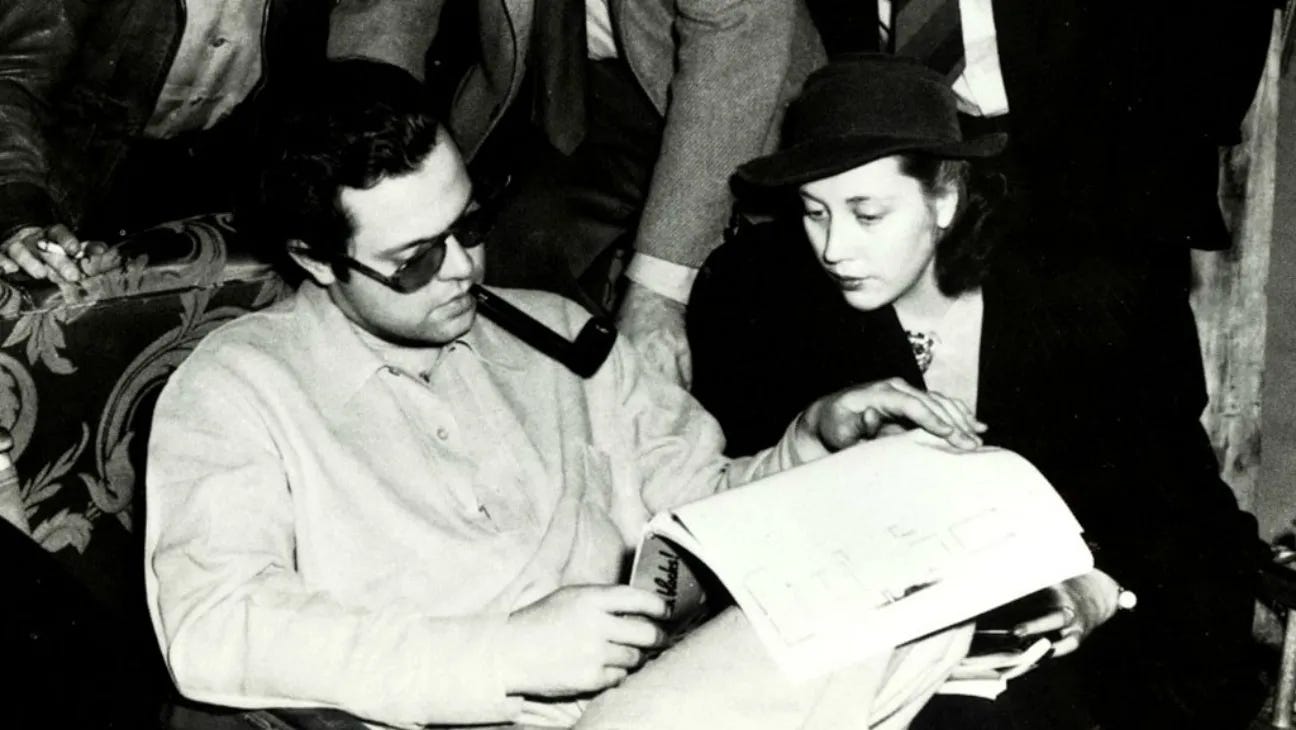One of the revelations of Laci’s archive was that Laci didn’t just keep letters from my grandfather; he also kept letters about my grandfather. This was especially true in 1939, when my grandfather was trying to escape Nazi Europe. During that time, Laci was working relentlessly behind the scenes to give my grandfather contacts and connections as well as money and advice.
Tucked among Laci’s papers, I found several letters from Laci’s friends in Mexico. Most of the letters were from a woman named Kathryn Trosper. Kathryn sent Laci regular dispatches that included updates about my grandfather. Kathryn, it turns out, went to the immigration office in Mexico on my grandfather’s behalf, and also gave my grandfather cash on multiple occasions.
Kathryn Trosper’s first reference to Opapa comes on May 7, 1939, when my grandfather was still in Paris, trying to obtain a Mexican visa. Even at this point, Kathryn was working on his behalf:
Bright and early yesterday morning Piña and I started off to Gobernacion. There we were told that the Mexican Consulate in Paris had simply not received notice of a fianza being posted, that there was no such thing as demanding a guarantee in a bank in Paris, and so on. So we went to the French Line. There the man was so disagreeable, I can’t tell you. He said that he had no record of George Gerbner, that he hadn’t sold him a ticket, and almost kicked us out. I flew into a rage and started screaming like an Irish fishwife, until he finally found the letters, etc., and we left, after paying him and threatening him with all the gunmen in the Agrarian Department if he didn’t immediately send a cable to the Paris office advising them of the fianza.
Kathryn Trosper to Laslo Benedek, May 7, 1939
Wow! What a scene: Kathryn Trosper gives quite a colorful description of herself, “fly[ing] into a rage” at the French Line, “screaming like an Irish fishwife” when they told her that they “had no record of George Gerbner.” I liked her immediately.
It seems that whatever she did worked, and they “immediately sen[t] a cable to the Paris office advising them of the fianza.” This helps to explain something that I have found very perplexing: how did my grandfather get his visa ticket in Mexico? It sounds like he had Laci and Kathryn Trosper to thank — along with Ethel Troper, who lent him $250 in Paris to purchase the ticket.
Once my grandfather arrived in Mexico, Kathryn continued to help him out. In September, a few months after his arrival, Kathryn wrote the following to Laci:
Saw George yesterday. Didn’t have time to get money before. Poor kid had been without a cent for four days + waiting for me like I wait for Gabino. He had planned on going to Yucatan - 3rd class-boat - for 45 pesos but my delay dealt that a death blow. His English has improved marvelously + he looks extremely well. I didn’t have time to talk to him, but will soon.
Kathryn Trosper to Laslo Benedek, September 8, 1939
In a P.S., she added, “I gave George $30 + we’ll give him more as soon as I can get up.”
It’s interesting to read someone else’s descriptions of Opapa during this time. She calls him a “poor kid” in two of her letters, adding that while he “looks extremely well,” he has “been without a cent for four days.” She also offers some observations of his language skills, noting that “his English has improved marvelously.” I was interested to read this, because I have long been curious about my grandfather’s language skills during this time. He had studied English in Hungary, but had never been to an English-speaking country. From Kathryn’s comment, it seems that when Opapa first arrived in Mexico, his English was still mediocre. But after several months interacting with Americans, he had improved “marvelously.”
Money is a constant topic in Kathryn’s letters as well, and apparently, my grandfather was regularly asking for it. In a letter from sometime in October, Kathryn writes that Opapa was angry with her because he thought she was withholding money from Laci:
First of all, I guess, I’d better start with George. As I told you in the last letter, I had neglected him shamefully - until he saw me one day in Sanborn’s and came over and very accusingly and sorrowfully sat down with Janet and me and said that he had wanted to go to Tehauntepec but hadn’t for a number of reasons. Why, I asked. You know very well why, he said - because you didn’t bring me my money. Laci - I could have died. He thinks that I have money that you sent with me to give him from time to time, and was very hurt. I had given him $30 about the 8th of September, and figured that by the 1st of October, at least he wouldn’t be starving to death. But at any rate, that very afternoon, I took him 200 pesos. He said that you had been giving him $50 a month, and since he was leaving Paris 7, he would need it. So, the next day I met him in Sanborn’s and gave him 150 more pesos - which makes it approximately $500 pesos, or $100 for September and October.
Kathryn Trosper to Laslo Benedek, October (?) 1939
It’s unclear who is correct here, but what is clear is that my grandfather was broke, that Kathryn helped him, and that Laci was, perhaps, trying to get money to him through Kathryn. My guess is that Opapa was pretty desperate. In the draft of his autobiography, he wrote the following about his time in Mexico: “My stay in Mexico was interesting but difficult, because again, I had no money.” He also added that he subsisted on bananas for several days. This fits nicely with Kathryn’s description that he was a “poor kid” who had been “without a cent for four days.”
Kathryn also offered some insight into my grandfather’s companions in Mexico. Apparently, he was traveling some of the time with a “Polish doctor” he met on the S.S. Flandre:
As far as I know (that was about three days ago) he was going to Acapulco with this Polish doctor I told you about that he came on the boat with - and from there try to catch a boat to Salina Cruz in Oaxaca and from there some way to Tehauntepec. He has been to Acapulco, and I tried to discourage him from going there again, but he has a definite mind of his own and had already made it up.
Kathryn Trosper to Laslo Benedek, October (?) 1939
This is a helpful passage, because it allows me to reconstruct my grandfather’s movements in more details. I had started to do this in a previous post, but now I have more accurate information and can update the map:
Kathryn also talked to my grandfather about his plans for college, and she reported those conversations as well:
About his classes, etc., he his waiting to get the required subjects from you for the first semester at U.C.L.A., in case he has to pass some sort of an examination. I really will keep in touch with him and he can send me a wire if he runs out of money - so anything you want to relay to him, if you write me, I will get hold of him at once.
Kathryn Trosper to Laslo Benedek, October (?) 1939
In November, when Opapa was back in Mexico City, Kathryn wrote Laci. Once again, she was helping him with his immigration papers:
I want to get a short note off to you about George. He came over today and said that the American Consul had refused his American visa, that his Hungarian passport has transpired, and you know of course that his permission for Mexico is up the end of this month. That I am taking up with Piña tomorrow, but the rest of it has me frantic. What do you suggestion my doing[?] I know there is absolutely no sense in my interfering here with the Consul, because it would probably only get us both (George and me) in the soup. He had to pay his rent in this new place in advance, so I have him a hundred pesos...
Kathryn Trosper to Laslo Benedek, November 2, 1939
Again, I am amazed at how bad things seem to be going, and how unlikely it was that my grandfather was actually able to get a US visa. Kathryn, it seems, had some connections in the Mexican government, but she is still somewhat at a loss as to what to do. It’s a dire situation. And yet: soon thereafter, my grandfather was the proud owner of a US visa. Did she work her connections? Was he just lucky? It’s hard to know, but my guess is that the connections were important.
Kathryn also offered insight into Opapa’s state of mind during this precarious time:
George is apparently taking it in stride - and is only worried terribly about the Hungarians not renewing his passport, if they decide they need his services in the great Nazi Army of aggression.
Kathryn Trosper to Laslo Benedek, November 2, 1939
It is fascinating to learn that Opapa was “taking it in stride,” and that his main worry was that he would be forced to fight in the Hungarian army on the side of the Nazis. This was always what Opapa said — that he left Budapest so he wouldn’t have to serve in the Hungarian army. But I always thought this was not the real reason; I presumed he was just trying to cover up his fears of anti-Semitism in Hungary. That may also be the case, but it seems that he was, in fact, terrified of the prospect of fighting for the Hungarians.
Kathryn’s final letter about Opapa is on November 23, 1939, when Opapa had finally managed to get a visa but needed money for his passage:
About George - you have no idea what a shock your letter was to me. I thought surely when George asked me for the money for his ticket, that everything had been well written out between you two. It all happened while I was in the hospital (another sad story I’ll tell you when I see you - overdose of veronal - and I was unconscious for a couple of days, and was in the hospital for a week. During that time, George came to see me, and you can imagine the stupor I was in, and hardly paid any attention to what he was saying, except that he had gotten his visa and tickets, etc., so the day I got out of the hospital I rushed to the bank and got him $150, and he left that night.
Kathryn Trosper to Laslo Benedek, November 23, 1939
Lots of surprises in this passage: that Kathryn was in the hospital for a week, that there was some misunderstanding about finances, and that that Opapa borrowed $150 from her — roughly the equivalent of $3,300 today (!). This is probably the money he needed to purchase his ticket from Cuba to New Orleans, and to pay for his living expenses along the way. I’m not sure what the misunderstanding was, but the fact remains that it was Kathryn who “rushed to the bank” and gave Opapa the money he needed to make the final legs of the journey, from Mexico to Cuba to New Orleans. I wish I could thank her!
All of these letters made me wonder: who was Kathryn Trosper? I enjoyed her vivid writing style, and her letters emanated wit, conviviality, and warmth, even when she and Opapa had a misunderstanding. I decided to dig, and the first thing I discovered was that she was the last surviving cast member of Citizen Kane, which was filmed in 1940/1 (the following year). During that time, she was also the personal assistant to Orson Welles.
A bit more digging led me here, to a beautiful and moving obituary on Facebook written by Kathryn Trosper Popper’s daughter. In this wonderful tribute, Kathryn’s daughter includes a reference to her mother’s time in Mexico, which she described as a “magical/mystical/tumultuous year.” She also included some photos. This one is from Mexico:
And here she is with Orson Welles in 1940/1:
After reading the Facebook post by Kathryn Trosper’s daughter, I decide to contact Kathryn’s family, and let them know about this connection we shared. I heard back immediately, and my message was greeted by warmth and curiosity.
This connection, too, has been a revelation. One of the things I love about my research is that I have been able to better understand my grandfather as a full person: his experiences, his anxieties, his ambitions, and the way he changed over time. Sometimes, it’s easy to perceive the people he encountered — like Kathryn — as supporting characters in his life’s narrative. In fact, that’s how we all go through our lives most of the time: the people sitting at the table next to us, or passing us on the street, are supporting characters in our narrative about our own lives, in which we are always the center.
But of course each person is their own universe of complexity, emotion, and growth. As I learned more about Kathryn Trosper from her family, she started to come alive for me in a new way. These connections are a reminder, to me, of the wonder and depth of every single person, and I feel a deep sense of awe and appreciation: not only for the fact that Kathryn Trosper helped Opapa, but also for the glimpse into the fullness of her life, her family, and her legacy.
***
Nuts to crack:
How did Laci and Kathryn Trosper first meet? Was it in Mexico or in LA? In her letters, she references the Martons (i.e. Andrew Marton aka Bandi, and Jarmila Marton, who were close friends of Laci in LA) and clearly knows them. If that’s the case, perhaps Kathryn met Laci through the Martons?







Kathryn Trosper is my mother. Katharine's research has illuminated a part of mom's life I always had questions about. This is manna from heaven
More new information! This is great.